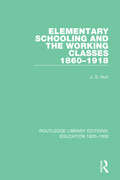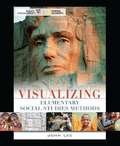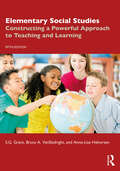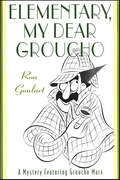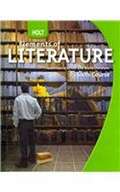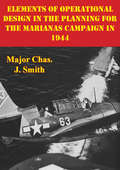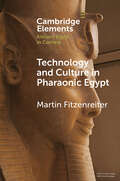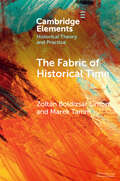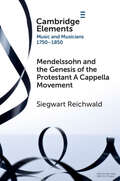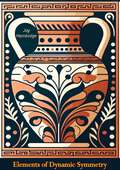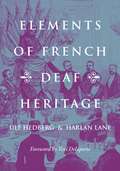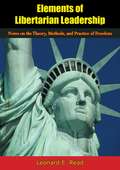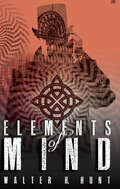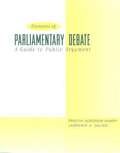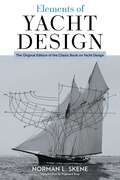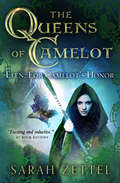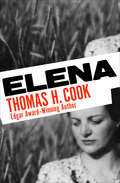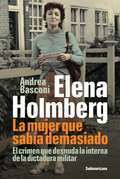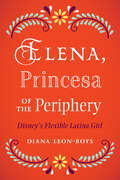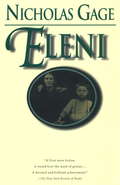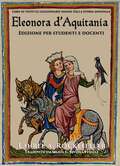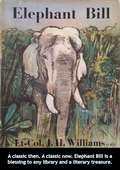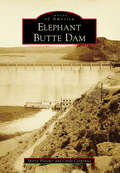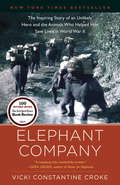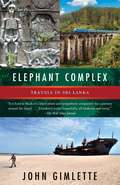- Table View
- List View
Elementary Schooling and the Working Classes, 1860-1918 (Routledge Library Editions: Education 1800-1926 #8)
by J. S. HurtThis study, first published in 1979, analyses the attitude of various income and occupational groups to elementary schools both before and after the introduction of compulsory school attendance. It also discusses the efforts made by voluntary organisations to provide school meals, as well as examining the quality of the meals themselves, before the enactment of remedial legislation in the early twentieth century. This title will be of interest to students of history and education.
Elementary Social Studies Methods
by John K. LeeAn excellent resource for social studies teachers, this book will help them learn about and reflect on their responsibilities in our society. It focuses on classroom-based experiences and real-world contexts. The teaching methods discussed are also closely associated to social studies subject matter so they can be integrated into the actual classroom. Each chapter also examines how social studies is situated within the larger elementary curriculum to demonstrate the interdisciplinary nature of the instruction.
Elementary Social Studies: Constructing a Powerful Approach to Teaching and Learning
by Bruce A. VanSledright S.G. Grant Anne-Lise HalvorsenThe fully updated fifth edition of Elementary Social Studies provides a rich and ambitious framework to help social studies teachers achieve powerful teaching and learning results. Organized around four commonplaces of education—learners and learning, subject matter, teachers and teaching, and classroom environment—and deeply rooted in inquiry-based teaching and learning, this book deeply probes the basic elements of quality instruction—planning, implementation, and assessment—always with the goal of creating and supporting students who are motivated, engaged, and thoughtful.Book features and updates to the fifth edition include: • New guidance on tackling controversial issues in the social studies classroom. • Fully revised chapter on creating a genuine learning community, which now addresses socio-emotional learning and family involvement in the classroom. • New perspectives on the importance of teaching for social justice. • Increased attention to the C3 Framework for state social studies standards. • Chapters on using the Inquiry Design Model (IDM) to understand inquiry-based teaching and learning and to develop IDM inquiries. • Real-classroom narratives that introduce chapters and provide in-depth access to teaching and learning contexts. • Practical curriculum and resource suggestions for the social studies classroom. • End-of-chapter summaries and annotated teaching resources.By blending the theoretical and the practical, this book is essential reading for pre-service and in-service social studies teachers.
Elementary, My Dear Groucho: A Mystery featuring Groucho Marx (Private Eye Groucho Marx)
by Ron GoulartWhen a body is found in Holmes's 221B Baker Street lodgings on the set at Mammoth Studios during the shooting of The Valley of Fear, Groucho Marx and his sidekick Frank Denby begin investigating, in Ron Goulart's hilarious mystery Elementary, My Dear Groucho. The victim is the German emigre director of the movie who was found in the great detective's favorite armchair, stabbed in the chest with Holmes's pearl-handled letter opener. There is another murder but it takes more than murder to stifle Groucho's quips or to quiet the laughter this surprising reincarnation inspires. "Chance meetings with celebrities and Groucho's constant wordplay keep the action light and snappy." - Publishers Weekly
Elements Of Literature: Essentials Of British And World Literature, Sixth Course (Holt Elements Of Literature Ser.)
by Beers Rinehart And Winston HoltElements of Literature; Essentials of British and World Literature, sixth course, 2009 1st Edition
Elements Of Operational Design In The Planning For The Marianas Campaign In 1944
by Major Chas. J. SmithOperational art and the operational level of war became a doctrinal focus for the U.S. Army in the 1980s. This focus led to the development of the elements of operational design. These concepts are not new, and were developed in the interwar period prior to World War II at the staff and war colleges. During this time, however, the military did not doctrinally recognize the operational level or war or operational art. Even though the concepts were not recognized, the intellectual process permeated the officer education system prior to World War II. Clearly, American officers in World War II used something of operational art, including in the planning and execution of the Marianas Campaign. This monograph looks at the question in more detail, by testing the extent to which planners within CENPAC used the elements of operational design in the Marianas Campaign, including end state and objectives, effects, center(s) of gravity, decisive points, direct and indirect action, lines of operation, operational reach, simultaneity and depth, timing and tempo, leverage, balance, anticipation, culmination, and arranging operations. The implication of this study is that as current doctrine evolves, the development, education, and execution of operational concepts in the World War II era continue to be useful.
Elements in Ancient Egypt in Context: Actor Network Theory And The Archaeology Of Things And People (Elements In Ancient Egypt In Context Ser.)
by Martin FitzenreiterElements in Historical Theory and Practice: The Fabric of Historical Time (Elements In Historical Theory And Practice Ser.)
by Marek Tamm Zoltán Boldizsár SimonElements in Music and Musicians 1750–1850: Mendelssohn and the Genesis of the Protestant A Cappella Movement (Elements In Music And Musicians 1750-1850 Ser.)
by Siegwart ReichwaldElements of Dynamic Symmetry (Dover Art Instruction Ser.)
by Jay HambidgeUnlock the secrets of nature's inherent harmony with Jay Hambidge's seminal work, Elements of Dynamic Symmetry. This groundbreaking book introduces readers to the principles of dynamic symmetry, a system of proportion and design that underlies the natural world and has been used by artists, architects, and designers throughout history to create aesthetically pleasing and harmonious compositions.Jay Hambidge, a pioneer in the study of geometric proportion, presents a comprehensive exploration of dynamic symmetry, tracing its origins and applications across various fields. Through clear explanations, detailed diagrams, and insightful analysis, Hambidge demonstrates how these principles can be applied to achieve balance and beauty in art and design.Elements of Dynamic Symmetry delves into the mathematical foundations of this system, exploring the ratios and relationships that govern dynamic symmetry. Hambidge illustrates how these principles can be found in natural forms, from the spirals of shells to the branching of trees, and how they have been employed in the masterpieces of classical and modern art, from ancient Greek temples to Renaissance paintings.Elements of Dynamic Symmetry is an essential read for artists, architects, designers, and anyone interested in the intersection of art, mathematics, and nature. Hambidge's pioneering work continues to inspire and inform, offering timeless insights into the universal principles of beauty and harmony.Join Jay Hambidge on a journey through the elements of dynamic symmetry and discover how these principles can transform your understanding of design and aesthetics. This classic text remains a cornerstone in the study of proportion and a testament to the enduring power of geometric harmony in the creation of art.
Elements of French Deaf Heritage
by Harlan Lane Ulf HedbergFrench Deaf culture is regarded as a major influence on the formation of other Deaf cultures around the world, notably American Deaf culture. In Elements of French Deaf Heritage, Ulf Hedberg and Harlan Lane document the development of Deaf culture in France by way of Deaf schools, Deaf associations, private and professional networks, publishing, and the arts. This highly visual work captures these forces from the late 18th century through the end of the 19th century, when cultural formation began to shift to cultural maintenance. Encyclopedic in scope, this examination of the evolution of Deaf ethnicity in France aims to disseminate an extensive amount of archival information, now available for the first time in the English language.
Elements of Libertarian Leadership: Notes on the Theory, Methods, and Practice of Freedom
by Leonard E. ReadIn this book, first published in 1962, the author and founder of the Foundation for Economic Education, Leonard E. Read, skilfully organizes his numerous, previously published FEE materials into a single, usable manual “for those who would give liberty a hand.”“The emphasis in this volume is on methodology. Assuming an individual has mastered the philosophical aspects of freedom, what can he do about it? With whom does he work? What are his limitations? His potentialities?”—Leonard E. Read, Foreword
Elements of Mind
by Walter H. HuntA doctor in Victorian India who performs surgery using mesmerism and drawing power from an artifact commits suicide before delivering the artifact to Rev. William Davey at the Committee of English Mesmerists, prompting Davey on a quest. Davey uncovers much more than just an artifact. The chthonoi, ancient, banished, elemental spirits now seek to open the glass Door and reassert themselves in the word of man.
Elements of Parliamentary Debate: A Guide to Public Argument
by Lawrence Galizio Trischa KnappElements of Parliamentary Debate: A Handbook is the first complete guide available to students on parliamentary debate. The brief handbook covers the basics of parliamentary debate in an easy-to-use and flexible format. Topics covered include debate preparation, resolution analysis, case construction, refutation, argumentation, and delivery and adjudication. As a text or supplement, Elements of Parliamentary Debate offers a handy reference guide to students, instructors and coaches interested in, or now practicing, parliamentary debate.
Elements of Yacht Design: The Original Edition of the Classic Book on Yacht Design
by Norman L. Skene"This book is intended to be a practical and concise presentation of some of the operations involved in designing yachts of all types. Cumbersome and impractical methods which are so often found in more pretentious works on naval architecture have been avoided. Those presented have been in everyday use by the author." Thus wrote Norman L. Skene in the preface to the fifth edition of Elements of Yacht Design.Skene's is one of the most famous books on yacht design ever written. First published in 1904, Skene did several revisions, the last of which was published in 1938 and is reprinted here in its original form. In 1962, the book was completely revised by Francis S. Kinney and republished as Skene's Elements of Yacht Design. Kinney's last version was published in 1973 and it is long out of print.While the experts are divided on the relative merits of the different editions, it appears that there is strong demand for Skene's original work. At last the book is again available to the many boatbuilders, aspiring naval architects, and sailors who need it for frequent reference. The index has been completely revised and expanded to make it more useful for today's readers.
Elen: For Camelot's Honor (The Queens of Camelot #2)
by Sarah ZettelIn this romantic fantasy from the award-winning author of Reclamation, a Welsh chieftain’s daughter and an Arthurian knight battle a vile sorceress. Steel and sorcery collide in this epic series featuring the women of Camelot. When treachery and violence destroy Elen’s homeland, a power begins to rise inside her. But it will take more than that untested magic to avenge her family, unite her people, and reclaim their land. Her enemy receives power from an evil source: the wicked sorceress Morgaine LeFay, who will stop at nothing to destroy King Arthur and his knights of Camelot. And she plans to use Elen to work for her own vile purpose. The thought of Elen in danger stirs something in the heart of Sir Geraint. Quiet and stalwart, he has always remembered the warmth they once shared. He will do anything to help her, even traveling undercover into enemy territory, where his martial skill and the love he shares with Elen will be put to the ultimate test . . . Praise for Elen: For Camelot’s Honor “Lyrical, heartwarming, and engaging.” —Explorations “Fine characterizations, lyrical writing, and intricate plotting make for a spellbinding journey.” —BookLoons Reviews
Elena
by Thomas H. CookA brother recalls the magnificent life of his sister, the greatest writer of her ageA launch party is underway for a hotly anticipated biography, the life story of Elena Franklin. As a young woman, Elena was one of the most promising literary talents of the 1920s, and over the years her legend grew. Her biographer, Martha Farrell, has combed through all the evidence of Elena&’s genius and passion, from her early years in New York to her expatriate life in Paris. The result is a monumental work – but among the party&’s crowd is the man who knows the book is an empty shell. Only William, Elena&’s brother, knew the truth about the famed author. Martha&’s flawed biography spurs his memory, and he recalls how the temperamental baby grew into a legend. He knew Elena&’s hidden pain, shared their family secrets, and draws his own portrait of the troubled soul that lay behind her artistic gifts.
Elena Holmberg. La mujer que sabía demasiado: El crimen que desnuda la interna de la dictadura militar
by Andrea BasconiEl caso Holmberg desnuda la historia de una víctima poco usual para ladictadura militar: ella era una de ellos. «Ando en problemas con los marinos del ministerio», le dijo ElenaHolmberg a su hermano, unos días antes de que su cuerpo aparecieraflotando en el río Luján, a la altura de Tigre. Elena era diplomática decarrera, hija de una familia patricia argentina y prima hermana del expresidente de facto Alejandro Agustín Lanusse. Una mujer de derechaconservadora confesa. Antiperonista y contraria a cualquiermanifestación de izquierda. Trabajó desde 1972 en la embajada argentinaen París, donde más tarde estuvo al mando del Centro Piloto, hasta queen los últimos meses de 1978 se ordenó sorpresivamente su traslado aBuenos Aires.Esta apasionante investigación periodística de Andrea Basconi, narradacomo si fuera una novela, reconstruye qué sucedió desde que a Elena laobligaron a subir a un Chevy que huyó a toda velocidad por la calleUruguay.¿Qué sabía Elena que era tan comprometedor para el almirante Massera? ¿Hasta dónde llegaron las esquirlas del delirio de poder y las internasde la última dictadura militar? Si Massera no se había reunido con lacúpula montonera y no les había pagado un millón de dólares paragarantizarse una alianza que terminara por destrozar a su enemigoíntimo, como sostenía Elena, ¿por qué los marinos la eliminaron luego delas reuniones de la funcionaria con sus confidentes?
Elena, Princesa of the Periphery: Disney’s Flexible Latina Girl (Latinidad: Transnational Cultures in the United States)
by Diana Leon-BoysIn the summer of 2016, Disney introduced its first Latina princess, Elena of Avalor. Princesa of the Periphery explores this Disney property using multiple case studies to understand its approach to girlhood and Latinidad. Following the circuit of culture model, author Diana Leon-Boys teases out moments of complex negotiations by Disney, producers, and audiences as they navigate Elena’s circulation. Case studies highlight how a flexible Latinidad is deployed through corporate materials, social media pages, theme park experiences, and the television series to create a princess who is both marginal to Disney’s normative vision of princesshood and central to Disney’s claims of diversification. This multi-layered analysis of Disney’s mediated Latina girlhood interrogates the complex relationship between the U.S.’s largest ethnic minority and a global conglomerate that stands in for the U.S. on the global stage.
Eleni
by Nicholas GageIn 1948, in a Greek mountain village, Eleni Gatzoyiannis was arrested, tortured and shot. Her crime had been to help her children to escape from the Communist guerrillas during the Greek civil war who were abducting children and sending them to camps behind the Iron Curtain. Her son, Nicholas Gage, was then eight years old. Eventually he reached America and joined his father who was working there and sending money back to his family. In America Gage grew up to become one of The New York Times' best investigative reporters. He returned to Greece in 1977 as a Times correspondent and, gradually but increasingly obsessively, he began to reconstruct his mother's life and death. By the time he was finished he was ready to confront both his mother's executioners and his own memories. Eleni, an intensely moving and compelling book, is the fruit of his search for the truth.
Eleonora d'Aquitania: Edizione per studenti e docenti (Le leggendarie donne della storia mondiale #13)
by Laurel A. RockefellerAliénor era la donna più desiderata nel Medioevo – e non solo a causa della sua bellezza. Figlia maggiore del duca Guglielmo X d’Aquitania, ne ereditò, a quindici anni, l’immenso patrimonio e nello stesso anno, venne incoronata regina dei Franchi. Ma la bella duchessa non ebbe molta fortuna in amore, nonostante due matrimoni e dieci figli. I trovatori ne cantarono ampiamente la bellezza e la dilettarono con le gesta di re Artù ed i suoi cavalieri della tavola rotonda. Segnò il destino di due imperi emergenti e fece dell’Aquitania un fedele alleato dell’Inghilterra. La sua legenda perdura fino ai giorni nostri, questo libro racconta la sua emozionante storia. L'edizione per studenti e docenti è corredata da domande d'approfondimento alla fine di ogni capitolo.
Elephant Bill
by Lt.-Col. J. H. Williams O.B.E.A book comes along like this once in a lifetime. You read it as a small child, or even an adult, and never forget the images it conjures up of a wonderful Englishman who lives in the mysterious forests of faraway Burma and of the kind native people who teach him about their lovely country. But most of all, you never forget the elephants! For this is a story about those magnificent creatures. Though he was officially known as Lt. Colonel J. H. Williams, the author was known to the world at large as Elephant Bill. That is because he spent 25 years living with the elephants in the mountains and forests of Burma. There he trained them to haul teak logs out of the isolated jungles.Yet this is also a story of great courage, because when the Second World War struck it also came to Burma. The Japanese Imperial Army planned to confiscate the Burmese elephants, drafting them to make the bridges and railways they needed to invade India. When he learned of these plans to put his beloved animals to a war-like purpose, Elephant Bill knew what had to be done. The mighty kings of the jungle had to be evacuated to safety.This is thus the story not only of the peaceful days in the jungle, starting in 1921, but also the story of the largest elephant rescue in history. It tells the amazing account of how Elephant Bill, along with his friends and family, rode 45 of the great beasts across the mountains of Burma, before reaching safety in faraway India.A classic then. A classic now. Elephant Bill is a blessing to any library and a literary treasure.
Elephant Butte Dam
by Cindy Carpenter Sherry FletcherOn November 18, 1904, engineer B.M. Hall submitted his final report to the 12th National Irrigation Congress in El Paso, Texas. He concluded that the ideal location for a dam and reservoir would be a site in western New Mexico. A congressional act of February 25, 1905, authorized the construction of Elephant Butte Dam, the first civil engineering structure concerned with international allocation of water. Part of the Rio Grande Project, the dam and its reservoir would provide irrigation water for farmers along the Rio Grande in New Mexico, Texas, and Mexico. Today, Elephant Butte Dam is designated as a National Historical Engineer Landmark by the American Society of Civil Engineers (ASCE), the oldest national professional engineering society in the United States. The area is home to Elephant Butte Lake State Park, where camping, fishing, and water sports are enjoyed by both residents and tourists.
Elephant Company: The Inspiring Story of an Unlikely Hero and the Animals Who Helped Him Save Lives in World War II
by Vicki Constantine CrokeThe remarkable story of James Howard “Billy” Williams, whose uncanny rapport with the world’s largest land animals transformed him from a carefree young man into the charismatic war hero known as Elephant Bill<P> Billy Williams came to colonial Burma in 1920, fresh from service in World War I, to a job as a “forest man” for a British teak company. Mesmerized by the intelligence, character, and even humor of the great animals who hauled logs through the remote jungles, he became a gifted “elephant wallah.” Increasingly skilled at treating their illnesses and injuries, he also championed more humane treatment for them, even establishing an elephant “school” and “hospital.” In return, he said, the elephants made him a better man. The friendship of one magnificent tusker in particular, Bandoola, would be revelatory. In Elephant Company, Vicki Constantine Croke chronicles Williams’s growing love for elephants as the animals provide him lessons in courage, trust, and gratitude.<P> But Elephant Company is also a tale of war and daring. When Imperial Japanese forces invaded Burma in 1942, Williams joined the elite Force 136, the British dirty tricks department, operating behind enemy lines. His war elephants would carry supplies, build bridges, and transport the sick and elderly over treacherous mountain terrain. Now well versed in the ways of the jungle, an older, wiser Williams even added to his stable by smuggling more elephants out of Japanese-held territory. As the occupying authorities put a price on his head, Williams and his elephants faced his most perilous test. In a Hollywood-worthy climax, Elephant Company, cornered by the enemy, attempted a desperate escape: a risky trek over the mountainous border to India, with a bedraggled group of refugees in tow. Elephant Bill’s exploits would earn him top military honors and the praise of famed Field Marshal Sir William Slim.<P> Part biography, part war epic, and part wildlife adventure, Elephant Company is an inspirational narrative that illuminates a little-known chapter in the annals of wartime heroism.
Elephant Complex
by John GimletteNo one sees the world quite like John Gimlette. As The New York Times once noted, "he writes with enormous wit, indignation, and a heightened sense of the absurd." Writing for both the adventurer and the armchair traveler, he has an eye for unusually telling detail, a sense of wonder, and compelling curiosity for the inside story. This time, he travels to Sri Lanka, a country only now emerging from twenty-six years of civil war. Delving deep into the nation's story, Gimlette provides us with an astonishing, multifaceted portrait of the island today. His travels reveal the country as never before. Beginning in the exuberant capital, Colombo ("a hint of anarchy everywhere"), he ventures out in all directions: to the dry zones where the island's 5,800 wild elephants congregate around ancient reservoirs; through cinnamon country with its Portuguese forts; to the "Bible Belt" of Buddhism--the tsunami-ravaged southeast coast; then up into the great green highlands ("the garden in the sky") and Kandy, the country's eccentric, aristocratic Shangri-la. Along the way, a wild and often desperate history takes shape, a tale of great colonies (Arab, Portuguese, British, and Dutch) and of the cultural divisions that still divide this society. Before long, we're in Jaffna and the Vanni, crucibles of the recent conflict. These areas--the hottest, driest, and least hospitable--have been utterly devastated by war and are only now struggling to their feet.But this is also a story of friendship and remarkable encounters. In the course of his journey, Gimlette meets farmers, war heroes, ancient tribesmen, world-class cricketers, terrorists, a former president, old planters, survivors of great massacres--and perhaps some of their perpetrators. That's to say nothing of the island's beguiling fauna: elephants, crocodiles, snakes, storks, and the greatest concentration of leopards on Earth. Here is a land of extravagant beauty and profound devastation, of ingenuity and catastrophe, possessed of both a volatile past and an uncertain future--a place capable of being at once heavenly and hellish--all brought to vibrant, fascinating life here on the page.From the Hardcover edition.
